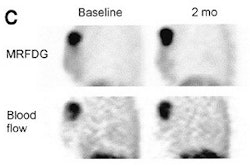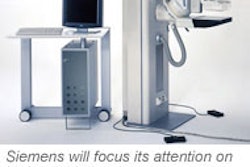A telephone survey of more than 4,000 people in four countries indicates that most women significantly overestimate the health benefits of screening mammography -- a finding the researchers describe as potential evidence of inadequate informed consent.
Many women in the U.S., U.K., Italy, and Switzerland also share a fundamental misunderstanding about the exam, believing that it prevents or reduces the risk of developing cancer.
The survey findings were reported by mostly university-based European health researchers in the latest issue of the bimonthly International Journal of Epidemiology (October 2003, Vol. 32:5, pp. 816–821).
The authors said theirs was the first international study of women’s perceptions of mammography’s benefits using random-sampling techniques in the general population.
Interestingly, the misperceptions of mammography were "somewhat more pronounced" in the U.K. and Italy, the two countries with national screening programs.
"Centrally organized screening programs are governed by coverage targets, which determine, for example, payment to general practitioners," the authors wrote. "It seems possible that this may act as a deterrent to giving complete and balanced information."
In each of the countries, women with higher education were more likely to have an accurate understanding of mammography.
In the first question, the randomly dialed participants were asked their opinion as to whether "regular mammography every two years in women who are well:"
• "Prevents the risk of contracting breast cancer;"
• "Reduces the risk of contracting breast cancer;" or
• "Does not have any influence on the risk of contracting breast cancer."
Around 37% of the 1,003 women queried in the U.S. chose the third/correct answer, compared to 22% of the British respondents, 16% of the Italian, and 26% of the Swiss.
Some 57% to 81% of women in each country chose one of the incorrect answers, while 3% to 9% said they didn’t know.
Two additional survey questions tested the women’s knowledge of the arguably obscure statistics regarding mammography’s efficacy. In any case, the answers clearly reflected a substantial overestimation of the exam’s benefits.
One question asked participants to what extent regular mammographic screening every two years for 10 years would reduce breast cancer mortality for women over age 50. The correct answer, about a 25% reduction, was chosen by 19% of the respondents. More than 60% of the women thought mammographic screening reduced breast cancer deaths by half or more.
Likewise, when asked how many women out of 1,000 would have their lives saved by biannual screening over age 50, only 2% of the women correctly answered that around 5 lives in 1,000 would be saved (a statistic based on World Health Organization data, according to the article’s authors). Most women believed that mammographic screening would save at least 10 lives per 1,000 women, with the largest percentages believing that more than 100 lives per 1,000 would be saved.
The study authors defended the clarity of their questions, noting that they had been pre-tested in a focus group and a pilot study. But they acknowledged that "(the) very small number of correct answers to our third question nevertheless raises the possibility that some women may have misunderstood the question and assumed that it related to women with breast cancer…."
As for what to make of their findings, the authors noted that studies have shown women are more likely to undergo screening mammography based on a greater degree of perceived health benefits.
However, the researchers wrote, "Using selected information about screening for encouraging high uptake is not appropriate, and there is an urgent need for correcting the misconceptions that are prevalent in the population."
Asked by AuntMinnie.com to comment on the study, Dr. Daniel Kopans, director of breast imaging at Massachusetts General Hospital in Boston, wrote: "I am always amused that investigators are surprised that we all fail to accurately estimate risks and benefits."
"At the end of this article the authors display their own lack of understanding by suggesting that the age of 50 has any significance, and by giving the review by Gotzsche and Olsen any credence," Kopans continued. "There is no debate that we all should be provided with all of the information possible with regard to medical interventions, but authors should understand the data themselves before they try to explain it to others."
By Tracie L. Thompson
AuntMinnie.com staff writer
December 17, 2003
Related Reading
Racial disparities in breast cancer outcomes spark research, October 10, 2003
Calif. Asians, Latinos miss cancer screening-study September 18, 2003
Racial inequities in healthcare not only factor influencing breast cancer survival, July 29, 2003
Chinese women respond best to doctors' breast cancer screening advice, February 19, 2003
U.K. group accuses breast cancer screening advocates of disinformation, July 11, 2003
Grassroots groups address high breast cancer rate among immigrants, March 30, 2001
Copyright © 2003 AuntMinnie.com



















